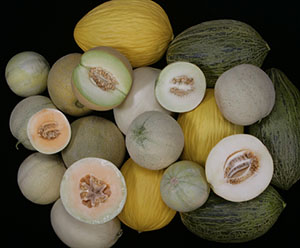Melons, Specialty (Cantaloupe, Honeydew, etc.)
Specialty melons (Cucumis melo) have cultural requirements similar to the more familiar muskmelon (cantaloupe). These melons offer consumers outstanding eating quality and a range of flesh colors, textures, and flavors. With one exception, cultivars of the specialty types listed below have performed well in University of Kentucky research trials. Consult the Vegetable Production Guide for Commercial Growers (ID- 36) for the latest variety recommendations.
Marketing
In Kentucky, direct markets are the primary market channels for specialty melons. Farmers markets, on-farm stands, local restaurants and specialty groceries, as well as community supported agriculture (CSA), are good possibilities for marketing high-quality specialty melons. Produce auctions are an outlet where producers may also be able to move smaller quantities of specialty melons at wholesale prices or higher. ‘Sprite’ melons, as well as canary melon variety ‘Camposol’, are two specialty melon varieties that have been evaluated as suitable for shipping wholesale from Kentucky.
Production

Specialty melons can be grown on medium-textured soils, but do best when grown on sandy or sandy loam soils that are well-drained. Melons should not follow melons, other cucurbits, or solanaceous crops (e.g. tomatoes, peppers, eggplant, and tobacco) in the rotation for at least three years because of potential disease problems. Since many specialty melon seeds are expensive, transplanting, rather than direct-seeding, is recommended. Transplants can be produced either in a greenhouse or hotbed. There is little competition for specialty melons in the market, so slightly later planting allows them to ripen in late July and throughout August when there is less rain. This increases melon flavor and sugar content.

